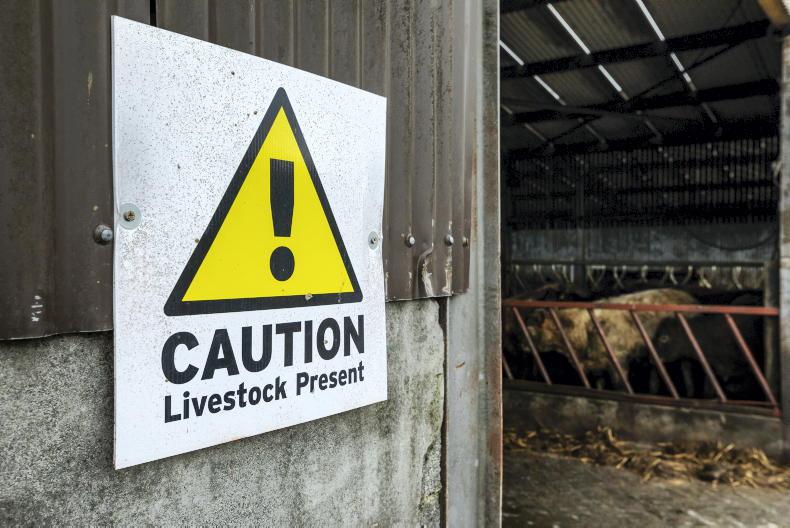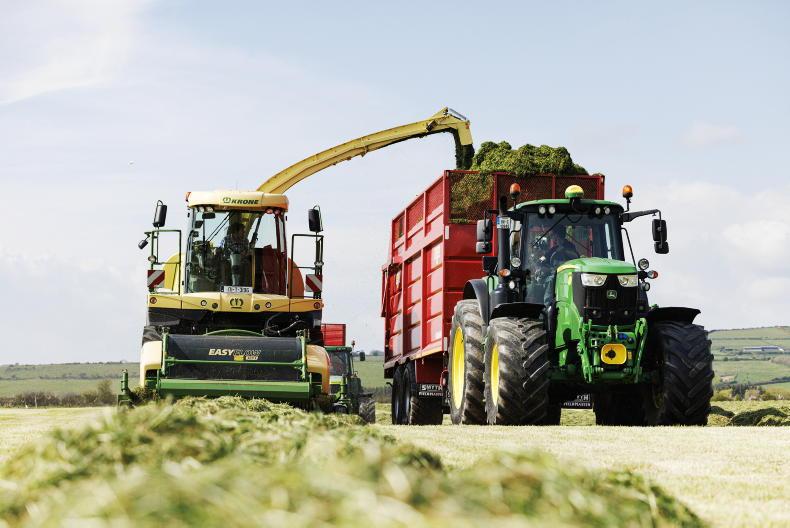Dairy farmers are among the hardest workers in Ireland in terms of hours worked, where it is not unusual for the average dairy farmer to work an average of 90 hours per week at certain times of the year.
With the abolition of quotas and increased expansion, a lot of farmers went through 2015 and the subsequent period of price volatility that followed, where many couldn’t afford to hire outside help. Farmers should be well aware of the impact that this added workload has on their mental health. This added strain caused depression and in some cases suicide in dairy farmers in Ireland and abroad, with one New Zealand publication reporting suicide rates among dairy farmers tripled in the Waikato region in 2015. Mental distress also leads to increased expectation of accidental injury.
As 90% of farmers in Ireland are spring milk producers and are winding down production for the year, we look at ways they can improve various techniques farmers can learn to improve their management skills, which can lead to improvements in mental health over the dry period.
Financial Management
As I have already mentioned, farmers are all too familiar with the financial problems associated with milk price volatility of the last few years. As financial concerns are one of the main causes of stress in dairy farmers, we look at various ways to reduce it by encouraging more efficient ways of managing resources.
Importance of farm financial management
Through understanding your farm’s financial performance you will generally gain an understanding of how well the farm is operating as a whole. It is only through regular reviews of your farm’s financial performance (through looking at cashflow analysis, etc) that you can keep on top of your farm’s finances and stop what could be small problem in the short term becoming a much larger problem further down the line.
Financial management tools
All dairy farmers should keep regular annual cashflow analysis including budgets and a budgetary plan for the future, a breakdown of all assets and liabilities of the farm business and farm households. It can be a very useful exercise to benchmark your farm’s performance against previous years and then make comparisons.
Help available
For those of you who aren’t financial wizards, there is plenty of help out there and now is the time of the year to brush up on your skills. Here is a list of some of the courses being offered to help develop skills in farm financial management:
Educational Training Boards (ETBs). Local Enterprise Offices (LEOs). Teagasc educational courses. Local Development Company. Regional Skills Forum. Skillnets. Money Advice & Budgeting Service. Also, there are a number of advisory bodies willing to help out, such as:
Your local Teagasc or MABS (Money Advice and Budgeting Service) officer who can help you to analyse your business and have useful tools available to help you keep records. Financial consultants are available to give guidance on managing finances. The farm accountant can provide an indication of financial performance. They can also make recommendations or refer you for more specialist advice.Farm Business Planning
Every farm family should set business and personal goals. This involves looking at your business strategically and deciding the best way to allocate your available resources (labour, time, money and equipment) in order to set achievable goals and obtain realistic results.
Importance of Farm Business planning
Running a farm without a plan is the equivalent of sailing without a map. You’ll run out of resources soon enough and end up adrift at sea, which can put more stress on the farmer, having a knock-on effect on their own mental health and that of their family. Many expanding farm businesses run out of cash, so it is important to complete a plan to prevent this and this in turn can make the financial planning outlined above easier.
A farm business plan should:
Be explained in full to all family partners and relevant stakeholders, who are made aware of their tasks and responsibilities. Contain clear, well described, obtainable goals. Be regularly reviewed. Have a well-defined time frame.Help in making and developing
a farm business plan
A farm adviser can provide specialist advice in helping to develop a business plan. The Teagasc workbook ‘My Farm, My Plan, Planning for my Future’ is one possible tool that can be used to form a farm business plan. This deals with issues such as :Where the farm is going.What it has to do to get there. How to evaluate of the extra costs, extra revenues and risks involved. Time and labour management
All the financial and business planning is worth nothing if you don’t manage your time and labour correctly. Inadequate time management can lead to working long hours, leading to an increase in fatigue and strain on mental health. This can cause reduced efficiency and the increase in fatigue can lead to more accidents. Poor labour management can be costly as it can lead to paying extra staff unnecessarily, leading to increased financial strain. Poor man management can lead to an unhappy workforce and a bad atmosphere on the farm.
Methods of better time and labour
managements
As herd size increases, the labour resources on farm become stretched. Initially, this is dealt with by adopting more efficient techniques and systems. These include compact calving, automatic calf feeding systems and good milking routine etc.
The use of relief staff (i.e. milkers, slurry heifer rearers etc. ) in busy times can reduce pressure.
Invest in training and welfare of staff to make sure they are up to speed on the most up to date skills required to perform their tasks.
Help available
The main sources of information include:
Citizens Information. Department of Social Protection. Health and Safety Authority. Workplace relations. Teagasc. Joint farming ventures.Being more aware of your mental health and those around you is one of the most important things you do, especially in the mentally draining world of dairy farming. We all have mental health, like we all have physical health.
Both change throughout our lives and our mind, like our body, needs looking after.
Mental health has to do with different aspects of our lives including how we feel about ourselves, how we feel about and interact with others and how we deal with the demands of life.
Good mental health is essentially about how you look after yourself physically and mentally. Mental health is a spectrum, that applies to everyone. It is all to do with daily living.
There are days when you can feel at either end of the spectrum either extremely high or on a devastating low. The ideal is to try to keep yourself somewhere in the middle, on a balanced even keel.
Warning signs
Unfortunately someone who is in a poor state of mental health may be unwilling to seek help about it, due to the stigma associated with poor mental health. The following is a list of some of warning signs you should watch out for in someone you expect may be suffering from mental health difficulties.
Feeling sad or down. Confused thinking or reduced ability to concentrate. Alcohol or drug abuse. Major changes in eating habits. Excessive anger, hostility or violence. Someone displaying suicidal tendencies and self-harming. Help
There is a host of options out there if you or somebody you know is suffering from mental health issues. Firstly you should confide in someone you know and trust. Then you can pick from one of the following options. www.mentalhealthireland.ie. www.yourmentalhealth.ie. HSE mental health services. Your local GP.And numerous other options also.
* Any information is offered as a strictly as a guideline not as an official diagnosis or recommended course of action.
Dairy farmers are among the hardest workers in Ireland in terms of hours worked, where it is not unusual for the average dairy farmer to work an average of 90 hours per week at certain times of the year.
With the abolition of quotas and increased expansion, a lot of farmers went through 2015 and the subsequent period of price volatility that followed, where many couldn’t afford to hire outside help. Farmers should be well aware of the impact that this added workload has on their mental health. This added strain caused depression and in some cases suicide in dairy farmers in Ireland and abroad, with one New Zealand publication reporting suicide rates among dairy farmers tripled in the Waikato region in 2015. Mental distress also leads to increased expectation of accidental injury.
As 90% of farmers in Ireland are spring milk producers and are winding down production for the year, we look at ways they can improve various techniques farmers can learn to improve their management skills, which can lead to improvements in mental health over the dry period.
Financial Management
As I have already mentioned, farmers are all too familiar with the financial problems associated with milk price volatility of the last few years. As financial concerns are one of the main causes of stress in dairy farmers, we look at various ways to reduce it by encouraging more efficient ways of managing resources.
Importance of farm financial management
Through understanding your farm’s financial performance you will generally gain an understanding of how well the farm is operating as a whole. It is only through regular reviews of your farm’s financial performance (through looking at cashflow analysis, etc) that you can keep on top of your farm’s finances and stop what could be small problem in the short term becoming a much larger problem further down the line.
Financial management tools
All dairy farmers should keep regular annual cashflow analysis including budgets and a budgetary plan for the future, a breakdown of all assets and liabilities of the farm business and farm households. It can be a very useful exercise to benchmark your farm’s performance against previous years and then make comparisons.
Help available
For those of you who aren’t financial wizards, there is plenty of help out there and now is the time of the year to brush up on your skills. Here is a list of some of the courses being offered to help develop skills in farm financial management:
Educational Training Boards (ETBs). Local Enterprise Offices (LEOs). Teagasc educational courses. Local Development Company. Regional Skills Forum. Skillnets. Money Advice & Budgeting Service. Also, there are a number of advisory bodies willing to help out, such as:
Your local Teagasc or MABS (Money Advice and Budgeting Service) officer who can help you to analyse your business and have useful tools available to help you keep records. Financial consultants are available to give guidance on managing finances. The farm accountant can provide an indication of financial performance. They can also make recommendations or refer you for more specialist advice.Farm Business Planning
Every farm family should set business and personal goals. This involves looking at your business strategically and deciding the best way to allocate your available resources (labour, time, money and equipment) in order to set achievable goals and obtain realistic results.
Importance of Farm Business planning
Running a farm without a plan is the equivalent of sailing without a map. You’ll run out of resources soon enough and end up adrift at sea, which can put more stress on the farmer, having a knock-on effect on their own mental health and that of their family. Many expanding farm businesses run out of cash, so it is important to complete a plan to prevent this and this in turn can make the financial planning outlined above easier.
A farm business plan should:
Be explained in full to all family partners and relevant stakeholders, who are made aware of their tasks and responsibilities. Contain clear, well described, obtainable goals. Be regularly reviewed. Have a well-defined time frame.Help in making and developing
a farm business plan
A farm adviser can provide specialist advice in helping to develop a business plan. The Teagasc workbook ‘My Farm, My Plan, Planning for my Future’ is one possible tool that can be used to form a farm business plan. This deals with issues such as :Where the farm is going.What it has to do to get there. How to evaluate of the extra costs, extra revenues and risks involved. Time and labour management
All the financial and business planning is worth nothing if you don’t manage your time and labour correctly. Inadequate time management can lead to working long hours, leading to an increase in fatigue and strain on mental health. This can cause reduced efficiency and the increase in fatigue can lead to more accidents. Poor labour management can be costly as it can lead to paying extra staff unnecessarily, leading to increased financial strain. Poor man management can lead to an unhappy workforce and a bad atmosphere on the farm.
Methods of better time and labour
managements
As herd size increases, the labour resources on farm become stretched. Initially, this is dealt with by adopting more efficient techniques and systems. These include compact calving, automatic calf feeding systems and good milking routine etc.
The use of relief staff (i.e. milkers, slurry heifer rearers etc. ) in busy times can reduce pressure.
Invest in training and welfare of staff to make sure they are up to speed on the most up to date skills required to perform their tasks.
Help available
The main sources of information include:
Citizens Information. Department of Social Protection. Health and Safety Authority. Workplace relations. Teagasc. Joint farming ventures.Being more aware of your mental health and those around you is one of the most important things you do, especially in the mentally draining world of dairy farming. We all have mental health, like we all have physical health.
Both change throughout our lives and our mind, like our body, needs looking after.
Mental health has to do with different aspects of our lives including how we feel about ourselves, how we feel about and interact with others and how we deal with the demands of life.
Good mental health is essentially about how you look after yourself physically and mentally. Mental health is a spectrum, that applies to everyone. It is all to do with daily living.
There are days when you can feel at either end of the spectrum either extremely high or on a devastating low. The ideal is to try to keep yourself somewhere in the middle, on a balanced even keel.
Warning signs
Unfortunately someone who is in a poor state of mental health may be unwilling to seek help about it, due to the stigma associated with poor mental health. The following is a list of some of warning signs you should watch out for in someone you expect may be suffering from mental health difficulties.
Feeling sad or down. Confused thinking or reduced ability to concentrate. Alcohol or drug abuse. Major changes in eating habits. Excessive anger, hostility or violence. Someone displaying suicidal tendencies and self-harming. Help
There is a host of options out there if you or somebody you know is suffering from mental health issues. Firstly you should confide in someone you know and trust. Then you can pick from one of the following options. www.mentalhealthireland.ie. www.yourmentalhealth.ie. HSE mental health services. Your local GP.And numerous other options also.
* Any information is offered as a strictly as a guideline not as an official diagnosis or recommended course of action.









SHARING OPTIONS